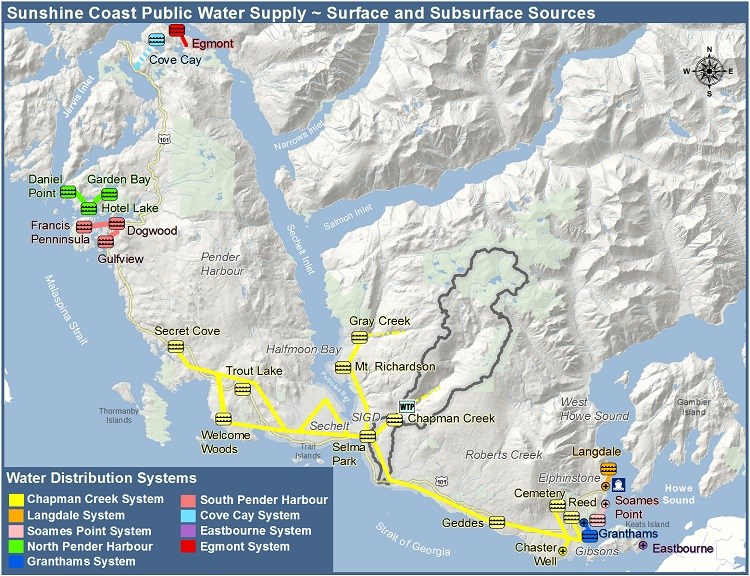While rains on Friday June 3 augmented the Coast’s ground water supplies, they put a damper on the Sunshine Coast Regional District's (SCRD) public engagement outside of the IGA in Pender Harbour. As this spring’s frequently rain cloud speckled skies put a stop to that event, regional district staffers showed up to talk with its constituents about the local government's long-term goals for the region’s water systems in an online session of June 7.
Other in-person consultation events are slated to continue throughout June. Out for public consideration until the end of this month is a ten-page document that reviews the current situation with the water systems managed by the SCRD. That includes annual dry season water use restrictions for water conservation. Stage 4 restrictions, which ban most outdoor water uses, have been introduced for those reliant on the region’s principal supply (the Chapman system) in four of the past seven years.
Public engagement is a follow-up step in the SCRD’s water strategy development. For more than two years, its board has been working with its Water Supply Advisory Committee, a group comprised of community volunteers, to help develop and implement water conservation planning in the area.
The June 7 event used up the 90 minutes that the SCRD had allocated for it, with over a dozen questions asked of infrastructure general manager Remko Rosenboom and manager of strategic initiatives Mia Edbrooke. The discussion areas ranged from how the SCRD balances development proposals approvals with the capacity of its water supply system to whether the often "brownish" water delivered to residences on the North Pender water system remains safe for consumption.
Staff noted that the safety of all SCRD drinking water supplies is monitored.
In relation to the demands of new development on the existing water system, Roosenboom noted areas on the SCRD's water supply experienced overall average growth of 1.75 over the last five years, lower than the two per cent that was planned in system development. He said "there is a need to balance" a variety of factors including sustainable development, water supply and support for affordable housing development on the Coast.
On the subject of water metering, Rosenboom stated that the SCRD does not have an agreement with shíshálh Nation regarding installation of meters on their lands. He said that discussions are ongoing on getting such an agreement in place so that SCRD water management staff can use metering to help identify water leaks on the Nation's lands
Upcoming meetings
On June 8 in-person roundtables, which will be held in each SCRD water system area to brainstorm community-generated ideas, are slated to be hosted at the Pender Harbour Community Hall, from 4 to 5:30 p.m. for those on the South Pender water system and from 6:30 to 8 p.m. for residents of the North Pender system area. June 9 the roundtable rolls over to the Egmont Community Club and will be open from 3 to 4:30 p.m (past Coast Reporter deadline).
The Granthams and Langdale water systems roundtable discussions are set to happen June 15 at Eric Cardinal Hall from 6 to 7:30 p.m.
The dates for discussion related to the Chapman system, with roundtable events set for June 15 from 10 to 11:30 a.m. at the SCRD’s main office on Field Road. Also at that location on June 28 an information booth on all components will be available for viewing. On June 16, between 6 and 7:30 p.m. discussions about the Chapman system are slated to happen at the Sechelt Aquatic Centre.
Roundtable discussions move to Keats Island and the Eastbourne water system on June 27. That is scheduled as a virtual event on the Zoom platform between 3 to 4:30 p.m., with participants asked to pre-register via email.
Pre-registration for that event and those that follow via email to [email protected] is requested.
A promise made in 2019
The SCRD held its first public water summit meetings in the spring of 2019. In opening those discussions, hosted at the Sechelt Legion, then-board chair Lori Pratt voiced a promise from the board to “do better” to supply constituents with consistent water supply year-round.
Three years later, the public document up for discussion asks for ideas on how to manage the water supply and infrastructure that exists and for input on what could be added to help achieve the board’s commitment to provide the Coast with a safe and reliable water supply.



